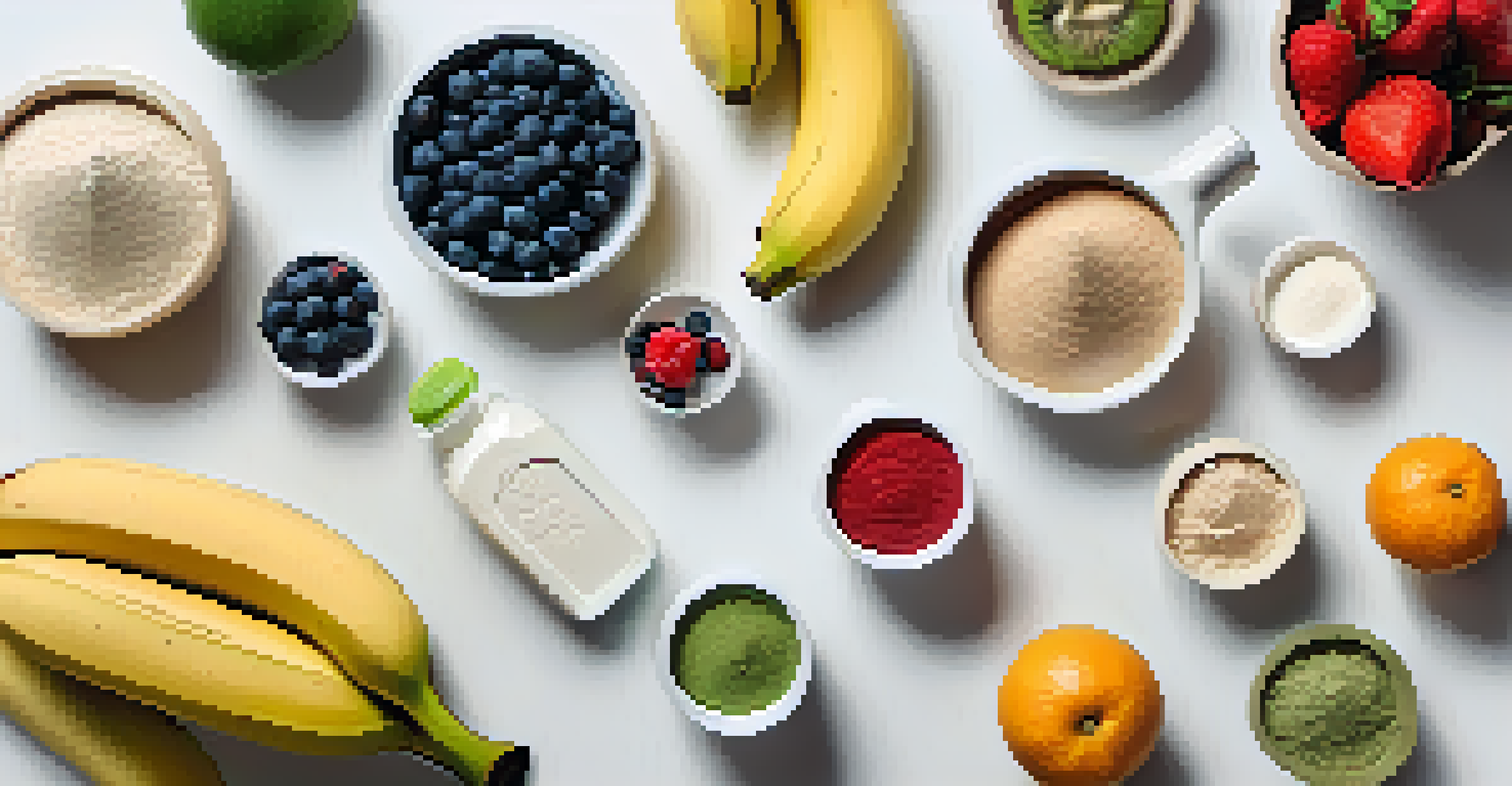Top Nutritional Supplements for Vegetarians to Enhance Health

Understanding Nutritional Needs for Vegetarians
Vegetarians often miss out on certain nutrients primarily found in animal products. This can lead to deficiencies if not addressed. Understanding these needs is essential for maintaining optimal health and energy levels.
Let food be thy medicine and medicine be thy food.
Key nutrients like protein, iron, vitamin B12, and omega-3 fatty acids are crucial for vegetarians. While a well-planned vegetarian diet can provide many of these, supplementation can help bridge any gaps.
For instance, vitamin B12 is predominantly found in animal sources, making it vital for vegetarians to consider a supplement to support nerve function and red blood cell formation.
Protein Supplements: Boosting Plant-Based Intake
Protein is fundamental for muscle repair and overall body function. Vegetarians can meet their protein needs through various plant sources, but sometimes, it isn’t enough.

Protein supplements, such as pea protein, hemp protein, or soy protein, offer convenient ways to enhance intake. They can be easily added to smoothies, oatmeal, or baked goods, making them versatile.
Essential Nutrients for Vegetarians
Vegetarians need to be aware of key nutrients like protein, iron, vitamin B12, and omega-3 fatty acids to prevent deficiencies.
Incorporating these supplements can help ensure you're getting enough protein, especially if you're active or looking to build muscle.
Iron Supplements: Combating Deficiency
Iron is essential for transporting oxygen in the blood, and vegetarians can sometimes fall short of their needs. Plant-based iron, known as non-heme iron, is not absorbed as efficiently as the heme iron found in meat.
The food you eat can either be the safest and most powerful form of medicine or the slowest form of poison.
To boost iron levels, vegetarians might consider an iron supplement, especially if they experience fatigue or have low energy. Pairing these supplements with vitamin C can enhance absorption.
Foods like lentils, chickpeas, and fortified cereals can also help, but a supplement can provide an extra layer of assurance for those at risk of deficiency.
Vitamin B12: A Crucial Supplement for Vegetarians
Vitamin B12 plays a key role in brain health and energy production. Since it’s primarily found in animal products, vegetarians must be mindful of their intake.
A B12 supplement is often recommended for vegetarians to prevent deficiencies, which can lead to neurological issues and anemia. Available in pills, sublingual tablets, or even fortified foods, options abound.
Importance of Supplementation
Supplementing with vitamins and minerals can help vegetarians meet their nutritional needs and maintain optimal health.
Maintaining adequate B12 levels is essential for overall health, making supplementation not just beneficial but necessary for many vegetarians.
Omega-3 Fatty Acids: Essential for Heart Health
Omega-3 fatty acids are crucial for heart and brain health, but they are typically found in fatty fish. For vegetarians, this can pose a challenge, prompting the need for supplementation.
Algal oil is a fantastic plant-based source of omega-3s, providing the same benefits as fish oil without the need for animal products. It's a sustainable option that supports overall health.
Including omega-3 supplements can help ensure you’re getting enough of these essential fats, contributing to better cardiovascular and cognitive health.
Calcium and Vitamin D: Building Strong Bones
Calcium and vitamin D are vital for bone health, especially for those who don’t consume dairy products. While many plant-based foods are calcium-rich, supplementation might still be necessary.
Vitamin D helps in the absorption of calcium, so taking both together can promote better bone density. Options like fortified plant milks and vitamin D supplements can be effective.
Consult Healthcare for Guidance
It's important to consult a healthcare provider before starting any supplements to tailor them to individual dietary needs.
Ensuring adequate intake of these nutrients can help prevent osteoporosis and support long-term bone health.
Probiotics: Supporting Digestive Health
Probiotics are beneficial bacteria that support gut health, which is vital for overall wellness. For vegetarians, maintaining a healthy gut flora can be particularly important due to dietary changes.
Supplements containing probiotics can help improve digestion and boost the immune system. They can also aid in the absorption of nutrients from plant-based foods.

Incorporating probiotic-rich foods like yogurt or fermented vegetables alongside supplements can create a balanced approach to digestive health.
Consulting a Healthcare Provider for Personalized Advice
Before starting any supplement regimen, it’s wise to consult with a healthcare provider. They can help assess individual needs based on dietary habits and lifestyle.
Personalized advice ensures that you’re taking the right supplements in the right amounts, helping to prevent any potential interactions or side effects.
A healthcare provider can also recommend blood tests to check for deficiencies, providing a clearer picture of what supplements might be necessary for your health journey.